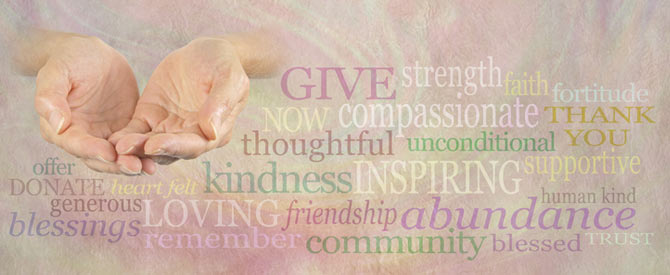No one has ever become poor by giving – Anne Frank
We are all products of the hard work and sacrifice of the people in our lives. We owe our education, values, material comforts and freedoms to our parents, teachers, mentors, leaders and others in our community.
It is important to give back. We can even look at it as our duty to do so.
What is the right way to give?
We can donate money, possessions, time, knowledge or talents to others. Spiritually, what matters is not so much what we give but how we give.
The writings of the ancient Bhagavad Gita describe three types of giving:
The highest form of giving comes from love and a sense of gratitude.
The next form is transactional – you give with an ulterior motive, a hidden agenda to get something back in return for your giving.
And the last type of giver rarely ever gives. And when he does, the giving is done resentfully, reluctantly and disrespectfully.
In this article, I describe the highest form of giving.
Noble Giving
Love is not patronizing and charity isn’t about pity, it is about love. Charity and love are the same – with charity you give love, so don’t just give money but reach out your hand instead. – Mother Teresa
Noble giving has 6 characteristics:
1. The giving comes from a feeling of deep gratitude.
There are many individuals, institutions, causes and organizations that we love and feel indebted to.
We feel an irresistible desire to serve and give back to those whom we love.
Service is a natural expression of love.As my Guru, Swami Chinmayananda says: You can give without love, but there can never be any love without giving.
2. The best is generously given.
The love and gratitude is so great that you don’t hold back on the quantity or quality of your giving.
You give the best of what you have, and never keep an account of what you are giving.
To you, nothing you give can ever be enough. The receiver, on the other hand, feels as though you have given a lot.
3. There are no ulterior motives or desires for any rewards. Giving is its own reward.
There is an old saying: The left hand should not know what the right hand is giving.
What this means is that you should give anonymously, without telling even those who are the closest to you. It also means that you should not congratulate yourself or take pride in your giving.
You give simply because you can and want sincerely to help. This in itself is your own reward. You want nothing else.
John Bunyan puts it nicely. You have not lived today until you have done something for someone who can never repay you.
4. The giving is done with humility and respect.
A humble, modern day saint, Rev. J.P. Vaswani tells us that when we get a chance to help others, we should thank the receiver for giving us the opportunity to help.
Without someone to receive our gift, we would not gain the benefit of being of service.
With such an attitude, giving will naturally be done with humility and respect.
5. The giving is unconditional
There are no conditions attached to the giving. The receiver of the gift has full freedom to do what he likes with it and the giver makes no demands as to the use of the gift by the receiver.
Of course, this does not mean that you give without thinking. You must investigate the authenticity and sincere need of the receiver to ensure that the funds do not go into the wrong hands.
 Food, clothing, water, and medicines to sustain life should be given to the needy without exception.
Food, clothing, water, and medicines to sustain life should be given to the needy without exception.
For instance, help during crises like earthquakes and other natural disasters should be given generously and promptly, without discrimination.
Factors such as the colour of skin, nationality, race, sex and age of the recipients do not play a part in this highest form of giving.
6. The giving is done promptly and efficiently.
You don’t waste time or second guess your decision to give after you have determined the urgency and genuineness of the need.
You give as soon as you can. Your conscience doesn’t allow you to sit quietly until you fulfill this urgent desire to be of service. You never need to be reminded by someone else.
The spiritual benefits
Selfless, generous giving advances our inner growth. It opens up our hearts and develops humility and an inner sensitivity to the needs of others.
It also helps to remove selfishness, pride and attachments to material objects.
It’s no wonder then, that all religions, cultures and traditions praise this highest type of giving.
Like this post? Sign up for the free fortnightly Spiritual Solutions Newsletter and receive the latest articles, news and updates in your email inbox!













Thank you for posting such beautiful articles. Love the quotes Enjoying reading all your posts so enriching !
I’m happy you are enjoying the articles, Manesha! Thanks for your kind words of encouragement.
You have lovingly given us all, the wealth of knowledge in these posts.. Very informative and thank you very much for all your efforts to benefit many like me..
Hello Kamal, I’m so happy to know that you are enjoying the articles and finding them of benefit. The truth of the matter is that I’m also gaining – I’m learning so much from the researching and writing. It’s a win-win for both of us!
Thanks for this thought-provoking article – brings to mind the Chinmaya Mission pledge: “… producing more than what we consume, and giving more than what we take…”
Yes..it’s a powerful reminder to be focused on giving and not on taking.
With your posts, you have successfully achieved what you set out to do… enriching our lives with your positivity. Enjoying the wonderful quotes too! Thank you, Manisha!
Thanks so much Shal. Glad to know you are enjoying the articles.
Thanks for sharing. I am blessed by this material. More power to you.
Thank you for your kind words, Isaac! I’m feeling blessed to be able to share what I have been taught.